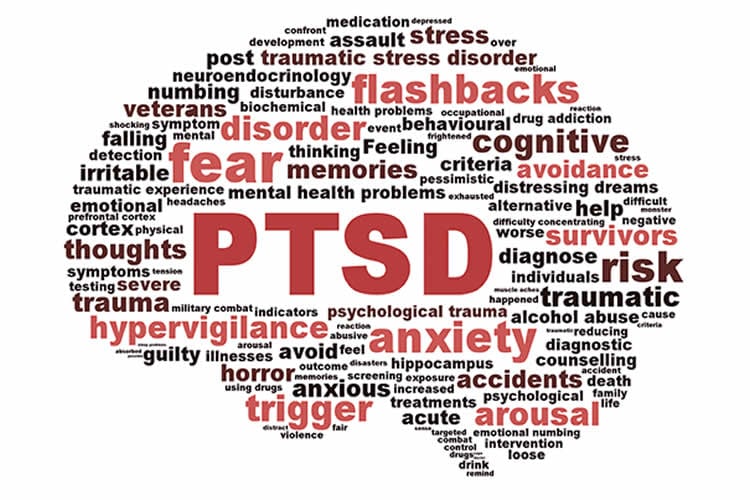Xenon exposure may be potential new treatment for people with PTSD.
Researchers at Harvard-affiliated McLean Hospital are reporting that xenon gas, used in humans for anesthesia and diagnostic imaging, has the potential to become a treatment for post-traumatic stress disorder (PTSD) and other memory-related disorders.
“In our study, we found that xenon gas has the capability of reducing memories of traumatic events,” said Edward G. Meloni, assistant psychologist at McLean and an assistant professor of psychiatry at Harvard Medical School (HMS). “It’s an exciting breakthrough.”
In the study, published in the current issue of PLOS ONE, Meloni and HMS Associate Professor of Psychiatry Marc J. Kaufman, director of the Translational Imaging Laboratory at McLean, examined whether a low concentration of xenon gas could interfere with a process called reconsolidation — a state in which reactivated memories become susceptible to modification. “We know from previous research that each time an emotional memory is recalled, the brain actually re-stores it as if it were a new memory. With this knowledge, we decided to see whether we could alter the process by introducing xenon gas immediately after a fear memory was reactivated,” explained Meloni.

The investigators used an animal model of PTSD called fear conditioning to train rats to be afraid of environmental cues that were paired with brief foot shocks. Reactivating the fearful memory was done by exposing the rats to those same cues and measuring their freezing response as a readout of fear. “We found that a single exposure to the gas, which is known to block NMDA receptors involved in memory formation in the brain, dramatically and persistently reduced fear responses for up to two weeks. It was as though the animals no longer remembered to be afraid of those cues,” said Meloni.
Meloni points out that the inherent properties of a gas such as xenon make it especially attractive for targeting dynamic processes like memory reconsolidation. “Unlike other drugs or medications that may also block NMDA receptors involved in memory, xenon gets in and out of the brain very quickly. This suggests that xenon could be given at the exact time the memory is reactivated, and for a limited amount of time, which may be key features for any potential therapy used in humans.”
“The fact that we were able to inhibit remembering of a traumatic memory with xenon is very promising because it is currently used in humans for other purposes, and thus it could be repurposed to treat PTSD,” added Kaufman.
For these investigators, several questions remain to be addressed with further testing. “From here we want to explore whether lower xenon doses or shorter exposure times would also block memory reconsolidation and the expression of fear. We’d also like to know if xenon is as effective at reducing traumatic memories from past events, so-called remote memories, versus the newly formed ones we tested in our study.”
Meloni and Kaufman indicate that future studies are planned to test whether the effects of xenon in rats that they saw in their study translate to humans. Given that intrusive re-experiencing of traumatic memories — including flashbacks, nightmares, and distress and physiological reactions induced by with trauma reminders — is a hallmark symptom for many who suffer from PTSD, a treatment that alleviates the impact of those painful memories could provide welcome relief.
Contact: Scott O’Brien – Harvard/McLean Hospital
Source: Harvard/McLean Hospital press release
Image Source: The image is credited to McLean Hospital and is adapted from the Harvard/McLean Hospital press release
Original Research: Full open access research for “Xenon Impairs Reconsolidation of Fear Memories in a Rat Model of Post-Traumatic Stress Disorder (PTSD)” by Edward G. Meloni, Timothy E. Gillis, Jasmine Manoukian, and Marc J. Kaufman in PLOS ONE. Published online August 27 2014 doi:10.1371/journal.pone.0106189
Xenon Impairs Reconsolidation of Fear Memories in a Rat Model of Post-Traumatic Stress Disorder (PTSD)
Xenon (Xe) is a noble gas that has been developed for use in people as an inhalational anesthestic and a diagnostic imaging agent. Xe inhibits glutamatergic N-methyl-D-aspartate (NMDA) receptors involved in learning and memory and can affect synaptic plasticity in the amygdala and hippocampus, two brain areas known to play a role in fear conditioning models of post-traumatic stress disorder (PTSD). Because glutamate receptors also have been shown to play a role in fear memory reconsolidation – a state in which recalled memories become susceptible to modification – we examined whether Xe administered after fear memory reactivation could affect subsequent expression of fear-like behavior (freezing) in rats. Male Sprague-Dawley rats were trained for contextual and cued fear conditioning and the effects of inhaled Xe (25%, 1 hr) on fear memory reconsolidation were tested using conditioned freezing measured days or weeks after reactivation/Xe administration. Xe administration immediately after fear memory reactivation significantly reduced conditioned freezing when tested 48 h, 96 h or 18 d after reactivation/Xe administration. Xe did not affect freezing when treatment was delayed until 2 h after reactivation or when administered in the absence of fear memory reactivation. These data suggest that Xe substantially and persistently inhibits memory reconsolidation in a reactivation and time-dependent manner, that it could be used as a new research tool to characterize reconsolidation and other memory processes, and that it could be developed to treat people with PTSD and other disorders related to emotional memory.
“Xenon Impairs Reconsolidation of Fear Memories in a Rat Model of Post-Traumatic Stress Disorder (PTSD)” by Edward G. Meloni, Timothy E. Gillis, Jasmine Manoukian, and Marc J. Kaufman in PLOS ONE, August 27 2014 doi:10.1371/journal.pone.0106189






